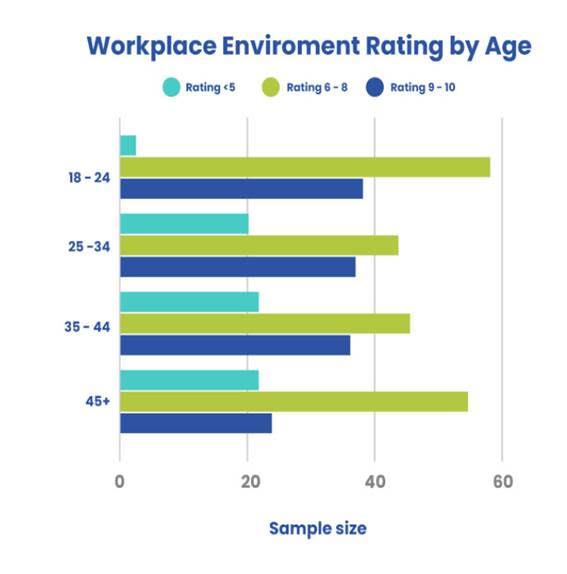Younger employees are generally happier at work than their older colleagues. This is according to the recent Floatpays State of Employee Wellbeing Barometer which shows that youth (18 – 24) generally rate their work environment better than their older peers.
Yet, in order to maintain a productive workforce and profitable business, South African employers must understand what drives employee wellbeing throughout the employee lifecycle and adapt accordingly.
The study by Floatpays drew on both qualitative and quantitative methodology to survey South African workers who represent a broad demographic in terms of age, gender, ethnicity, province and monthly household income. The study positions employee wellbeing programmes as a catalyst for change in the country’s labour productivity trajectory.
In terms of age groups, low ratings of the working environment increase with age – only 4% of 18 – 24 year olds rated their working environment 5 or lower (the lowest ranking), while this figure rose to 20% in the 25 – 34 age group, 22% in the 35 – 44 age group, and 26% in the 45 – 55 age group. This may be attributed to the optimism of youth as they begin their working life. Young people – owing to their life stage – have fewer expectations of their workplace – because of no or little past experience.

In order to foster staff engagement and ensure a productive workplace that supports a healthy bottom line, it is critical for employers to maintain and enhance the positive sentiment and experience of young people at work. The key is to understand what is important to young staff in order to prevent them from experiencing dissatisfaction similar to that of their older colleagues down the line.
So, what drives the sense of wellbeing and happiness amongst South Africa’s young employees?
‘High belonging teams’ are important
When asked about the factors that apply to their work environment, 82% of young employees highlighted ‘the company encourages togetherness of its members as a team’. High performing teams are ‘high belonging teams’ so it’s important that employers foster a sense of belonging amongst everyone in their business. Global business consultancy Gartner describes a ‘high belonging’ team as one where all employees within a team perceive the group to be one which fosters acceptance. Employees need to feel like they are accepted for who they are in order to perform at their best. DEI (Diversity, Equity & Inclusion) initiatives aimed at building high belonging teams should also account for generational differences and organisational ‘hierarchy’ (i.e. workers at all levels within a business).
Financial stress saps productivity, and young employees want support
According to the study, younger employees (aged 18 – 24 years) experience less financial stress than their older counterparts but are highly financially stressed none-the-less and are looking to achieve financial wellness. When asked what they think financial wellness entails, being able to manage within one’s budget, having financial knowledge and having something set aside for emergencies came out as the top three descriptions.
This demonstrates the need to equip younger employees with financial know-how early on in their working lives in order to reduce financial stress, and its destructive impact on productivity, later on. Equipping young employees with the knowledge and tools to manage their money well at the point they begin earning goes a long way in entrenching positive financial behaviors that will help them maintain financial wellness throughout their lives – this in turn reduces levels of financial stress, which has a direct positive impact on productivity and the business bottom line.
Findings showed that for young employees the most significant impact of financial stress on them was its negative impact on their mood (53% vs. 42% struggling to concentrate and 36% experiencing sleeping problems). A bad mood may seem harmless but it can have a very real and significant impact at work – from damaging working relationships to loss in motivation, an employee’s bad mood and its impact on the business is not something to dismiss.
Supporting young employees’ financial wellbeing secures a better future for employers
Supporting employees in the areas they need will inevitably improve employee-employer relationships, which in turn can translate into productivity gains.
When asked what would be most useful in improving their financial stress, young employees emphasized being financially prepared for an emergency (92%) and being educated on how to manage their money better (80%).
The overwhelming majority of young respondents stated that having their employer’s support in building their financial wellbeing would change their attitude to work (85%); shift their views on management and leadership (85%); improve their productivity at work (91%); and contribute positively to their physical and mental health (86%).
A focus on the employee wellbeing of young people entering the workforce can create a sustainable, positive change to the country’s productivity trajectory
The cost of lost productivity is great, and the need to increase labour productivity has never been more urgent. Investing in employee wellbeing – especially when it comes to young staff – is critical.
It is up to employers, the HR fraternity, and employees to take the next step towards the continued evolution of employee wellbeing; meeting unmet employee needs; enhancing the work environment for young talent; and lessening the impact and burden of financial stress on employees and businesses.


